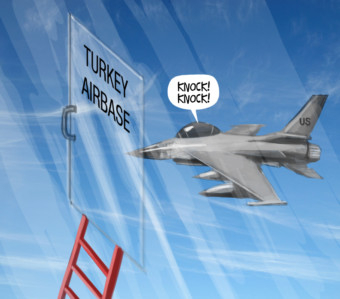
For the past few weeks, we have witnessed the grotesque spectacle of three Britons paraded before us by the Islamic State of Iraq and the Levant (Isil), one murdered on camera, another on his knees and threatened with the same, and the third compelled to recite propaganda. Others certainly wait in the wings, to play their unwilling part in these evil broadcasts. But imagine if Isil held as many as 50 Britons hostage.
How would the UK then respond? Would it still have despatched Tornados over Iraqi skies and urged the SAS into action? For Turkey, this is no hypothetical scenario. In June, Isil seized 46 Turkish diplomats as it blitzed through the northern Iraqi city of Mosul. Faced with the unimaginable prospect of a mass killing, Ankara was paralysed. Even though it is Nato’s only Muslim-majority member and the region’s most important military power behind Israel, it sat quietly as the US geared up for the third Iraq war in under 25 years, for fear of the fate that might befall its hostages.
It refused to allow US fighter jets to fly from Turkish airbases, forcing Washington to rely on an aircraft carrier as well as more distant bases in the Gulf nations. More controversially, three months ago Ankara would not permit its territory to be used as a base for the daring special forces operation to rescue a group of hostages, including the American journalist James Foley who was later murdered by Isil. On Saturday, however, Turkey’s hostages came home. The circumstances are murky, and it is more than likely that Isil got something in return — whether cash, prisoners, or a favour.
Nevertheless, this is a crucial opportunity for Turkey to end its national paralysis, shore up the wobbly US-led coalition to take on the terrorists, and to dispel older and deeper concerns about the maturity of its regional policy. This is a curious moment in the Middle East. As America seeks to corral its friends and partners into the fight, it is the Islamic Republic of Iran that has sent its warplanes and soldiers to fight Isil, while traditional western allies appear keener to stay out of the limelight.
Why should this be so? The truth is that Turkey’s ambivalence towards US policy was always about more than hostages. Ankara’s priority was, and remains, toppling the regime of Syrian President Bashar Al Assad. To do so, it allowed its border to be turned into a staging point for all manner of Syrian rebels, moderates and extremists alike. [But yesterday Turkey closed most of its border crossings with Syria after the entry of at least 130,000 Kurdish refugees].
Now, although Turkey acknowledges that Isil is a serious threat, it is concerned, like many Arab countries, that weakening the militant group while offering only tepid support to the Syrian opposition will ultimately boost the Al Assad regime and increase Iran’s regional influence. Admittedly, Turkish and American officials are working together in the border town of Reyhanli, and the US has committed to training 5,000 rebels — but this will take several months and Isil will still have six times the manpower.
Oil lifeline
Turkey bristles at the accusation that it “created” Isil, arguing, quite reasonably, that Al Assad’s brutality and his neglect of extremist strongholds played the largest role in the group’s rise. Turkey also points out that it has barred entry to 6,000 people suspected of trying to join the extremists, and deported another 1,000. What is clear, though, is that Ankara could still do more to tighten its border controls, clamp down on Isil’s funding, and put pressure on the group. Isil likely enjoys around $2 million (Dh7.34 million) per day in revenue from oil sales, much of which appears to flow through southern Turkey. While much international criticism has focused on private donors in Gulf states, it is now this flourishing oil market that is probably a much more important lifeline for Isil. Turkey needs to shut it down.
Ankara’s policy towards Iraq’s Kurds has also been somewhat incoherent. Although the semi-autonomous Kurdistan Regional Government (KRG) in Iraq’s north has played a crucial front-line role in the fight against Isil, its moves towards independence have destabilised an already shaky state and made it harder to secure the sort of broad, national consensus in Baghdad that is necessary to combating Isil.
Although Turkey insists it wants a united Iraq, it has effectively encouraged these Kurdish moves by facilitating hundreds of millions of dollars worth of Kurdish oil sales through a Turkish pipeline to the Mediterranean. While the Kurds have entirely reasonable grievances, and complain that Baghdad has withheld national oil revenue due to them, Turkey should, for the moment, be encouraging reconciliation rather than opportunistically driving a wedge between Baghdad and Arbil. There is, now, a bargain to be struck. The US has committed to hitting Isil in Syria, but says it will do so only if its allies publicly — rather than covertly, as has been promised so far — join in.
Turkey will be reluctant to take part unless the targets include not just Isil, but also the regime. Given the White House’s supremely cautious approach, this is unrealistic. Turkey, though, is deeply threatened by Isil now, and the priority must be to weaken it, rather than allow its pseudo-caliphate to put down deeper roots in Iraqi and Syrian cities. Turkey should open its bases to its allies, contribute forces and send a signal of its willingness to play a constructive role in what will be a region-defining war.
— The Telegraph Group Limited, London 2014
Shashank Joshi is Senior Research Fellow at RUSI.









